Working with Individual Learners: Roles and Responsibilities Explored
VerifiedAdded on 2023/06/08
|20
|7203
|487
Report
AI Summary
This report examines the roles and responsibilities of teachers, coaches, and mentors in supporting individual learners, emphasizing strategies to meet diverse learning needs. It details the differences between teaching, coaching, and mentoring, highlighting the importance of adapting teaching strategies to students' interests and learning strengths. The report also explores the multi-agency approach to learner development, including the resources required for effective collaboration and referral processes. Furthermore, it discusses the roles of teachers and coaches in enhancing learners' skills and building self-confidence. The report concludes with a reflection on the effectiveness of one-to-one teaching practices and identifies areas for personal improvement, emphasizing the ongoing assembly and consolidation of a teaching portfolio.
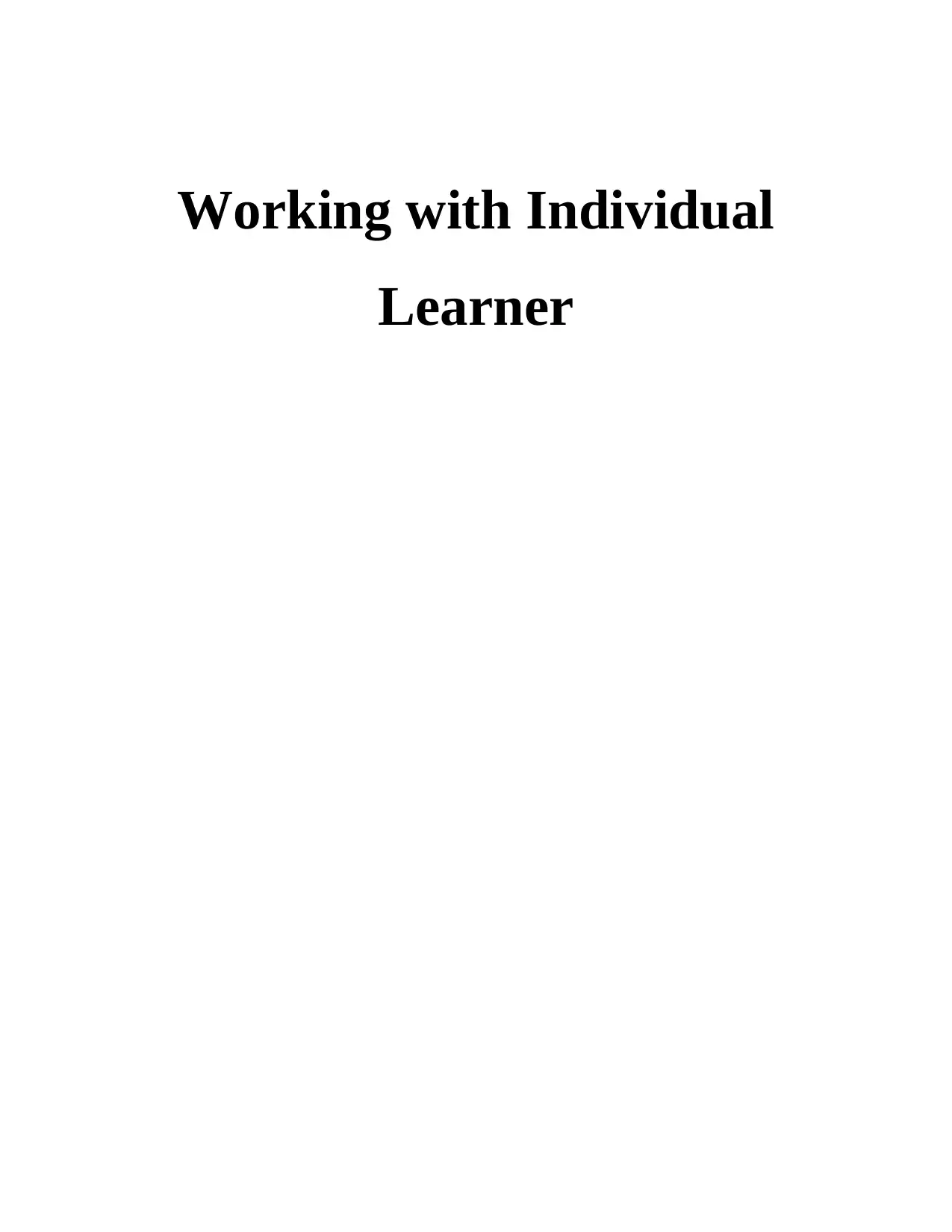
Working with Individual
Learner
Learner
Paraphrase This Document
Need a fresh take? Get an instant paraphrase of this document with our AI Paraphraser
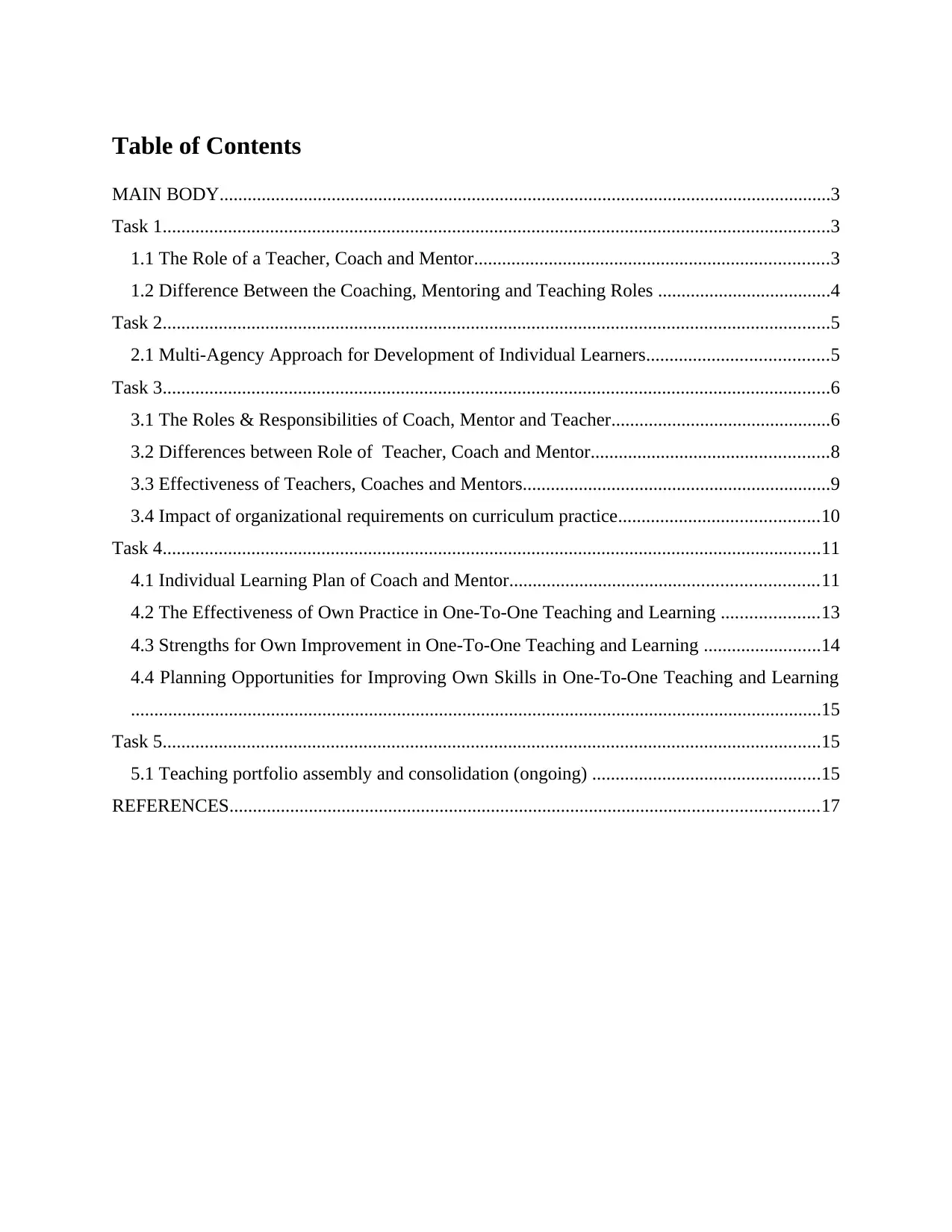
Table of Contents
MAIN BODY...................................................................................................................................3
Task 1...............................................................................................................................................3
1.1 The Role of a Teacher, Coach and Mentor............................................................................3
1.2 Difference Between the Coaching, Mentoring and Teaching Roles .....................................4
Task 2...............................................................................................................................................5
2.1 Multi-Agency Approach for Development of Individual Learners.......................................5
Task 3...............................................................................................................................................6
3.1 The Roles & Responsibilities of Coach, Mentor and Teacher...............................................6
3.2 Differences between Role of Teacher, Coach and Mentor...................................................8
3.3 Effectiveness of Teachers, Coaches and Mentors..................................................................9
3.4 Impact of organizational requirements on curriculum practice...........................................10
Task 4.............................................................................................................................................11
4.1 Individual Learning Plan of Coach and Mentor..................................................................11
4.2 The Effectiveness of Own Practice in One-To-One Teaching and Learning .....................13
4.3 Strengths for Own Improvement in One-To-One Teaching and Learning .........................14
4.4 Planning Opportunities for Improving Own Skills in One-To-One Teaching and Learning
....................................................................................................................................................15
Task 5.............................................................................................................................................15
5.1 Teaching portfolio assembly and consolidation (ongoing) .................................................15
REFERENCES..............................................................................................................................17
MAIN BODY...................................................................................................................................3
Task 1...............................................................................................................................................3
1.1 The Role of a Teacher, Coach and Mentor............................................................................3
1.2 Difference Between the Coaching, Mentoring and Teaching Roles .....................................4
Task 2...............................................................................................................................................5
2.1 Multi-Agency Approach for Development of Individual Learners.......................................5
Task 3...............................................................................................................................................6
3.1 The Roles & Responsibilities of Coach, Mentor and Teacher...............................................6
3.2 Differences between Role of Teacher, Coach and Mentor...................................................8
3.3 Effectiveness of Teachers, Coaches and Mentors..................................................................9
3.4 Impact of organizational requirements on curriculum practice...........................................10
Task 4.............................................................................................................................................11
4.1 Individual Learning Plan of Coach and Mentor..................................................................11
4.2 The Effectiveness of Own Practice in One-To-One Teaching and Learning .....................13
4.3 Strengths for Own Improvement in One-To-One Teaching and Learning .........................14
4.4 Planning Opportunities for Improving Own Skills in One-To-One Teaching and Learning
....................................................................................................................................................15
Task 5.............................................................................................................................................15
5.1 Teaching portfolio assembly and consolidation (ongoing) .................................................15
REFERENCES..............................................................................................................................17
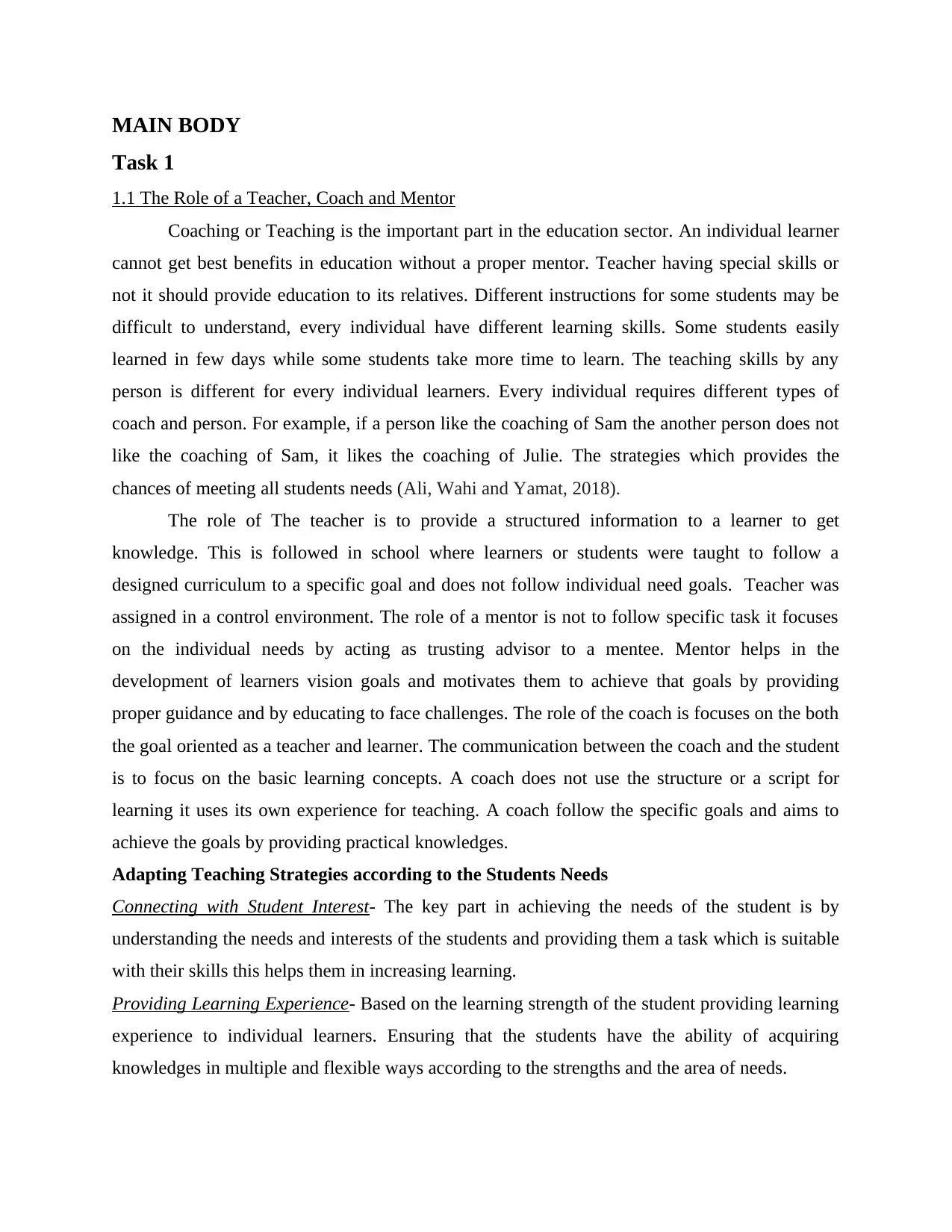
MAIN BODY
Task 1
1.1 The Role of a Teacher, Coach and Mentor
Coaching or Teaching is the important part in the education sector. An individual learner
cannot get best benefits in education without a proper mentor. Teacher having special skills or
not it should provide education to its relatives. Different instructions for some students may be
difficult to understand, every individual have different learning skills. Some students easily
learned in few days while some students take more time to learn. The teaching skills by any
person is different for every individual learners. Every individual requires different types of
coach and person. For example, if a person like the coaching of Sam the another person does not
like the coaching of Sam, it likes the coaching of Julie. The strategies which provides the
chances of meeting all students needs (Ali, Wahi and Yamat, 2018).
The role of The teacher is to provide a structured information to a learner to get
knowledge. This is followed in school where learners or students were taught to follow a
designed curriculum to a specific goal and does not follow individual need goals. Teacher was
assigned in a control environment. The role of a mentor is not to follow specific task it focuses
on the individual needs by acting as trusting advisor to a mentee. Mentor helps in the
development of learners vision goals and motivates them to achieve that goals by providing
proper guidance and by educating to face challenges. The role of the coach is focuses on the both
the goal oriented as a teacher and learner. The communication between the coach and the student
is to focus on the basic learning concepts. A coach does not use the structure or a script for
learning it uses its own experience for teaching. A coach follow the specific goals and aims to
achieve the goals by providing practical knowledges.
Adapting Teaching Strategies according to the Students Needs
Connecting with Student Interest- The key part in achieving the needs of the student is by
understanding the needs and interests of the students and providing them a task which is suitable
with their skills this helps them in increasing learning.
Providing Learning Experience- Based on the learning strength of the student providing learning
experience to individual learners. Ensuring that the students have the ability of acquiring
knowledges in multiple and flexible ways according to the strengths and the area of needs.
Task 1
1.1 The Role of a Teacher, Coach and Mentor
Coaching or Teaching is the important part in the education sector. An individual learner
cannot get best benefits in education without a proper mentor. Teacher having special skills or
not it should provide education to its relatives. Different instructions for some students may be
difficult to understand, every individual have different learning skills. Some students easily
learned in few days while some students take more time to learn. The teaching skills by any
person is different for every individual learners. Every individual requires different types of
coach and person. For example, if a person like the coaching of Sam the another person does not
like the coaching of Sam, it likes the coaching of Julie. The strategies which provides the
chances of meeting all students needs (Ali, Wahi and Yamat, 2018).
The role of The teacher is to provide a structured information to a learner to get
knowledge. This is followed in school where learners or students were taught to follow a
designed curriculum to a specific goal and does not follow individual need goals. Teacher was
assigned in a control environment. The role of a mentor is not to follow specific task it focuses
on the individual needs by acting as trusting advisor to a mentee. Mentor helps in the
development of learners vision goals and motivates them to achieve that goals by providing
proper guidance and by educating to face challenges. The role of the coach is focuses on the both
the goal oriented as a teacher and learner. The communication between the coach and the student
is to focus on the basic learning concepts. A coach does not use the structure or a script for
learning it uses its own experience for teaching. A coach follow the specific goals and aims to
achieve the goals by providing practical knowledges.
Adapting Teaching Strategies according to the Students Needs
Connecting with Student Interest- The key part in achieving the needs of the student is by
understanding the needs and interests of the students and providing them a task which is suitable
with their skills this helps them in increasing learning.
Providing Learning Experience- Based on the learning strength of the student providing learning
experience to individual learners. Ensuring that the students have the ability of acquiring
knowledges in multiple and flexible ways according to the strengths and the area of needs.
⊘ This is a preview!⊘
Do you want full access?
Subscribe today to unlock all pages.

Trusted by 1+ million students worldwide
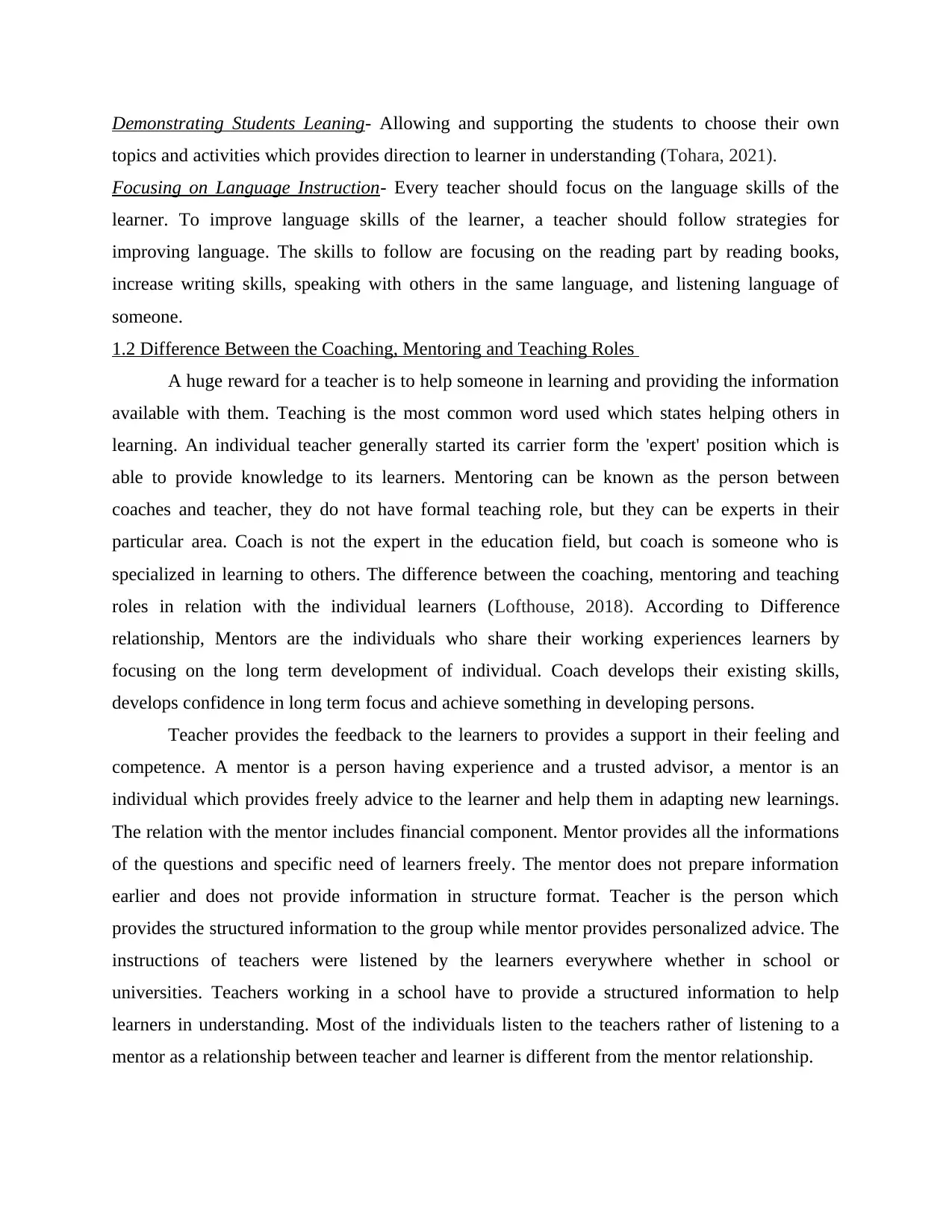
Demonstrating Students Leaning- Allowing and supporting the students to choose their own
topics and activities which provides direction to learner in understanding (Tohara, 2021).
Focusing on Language Instruction- Every teacher should focus on the language skills of the
learner. To improve language skills of the learner, a teacher should follow strategies for
improving language. The skills to follow are focusing on the reading part by reading books,
increase writing skills, speaking with others in the same language, and listening language of
someone.
1.2 Difference Between the Coaching, Mentoring and Teaching Roles
A huge reward for a teacher is to help someone in learning and providing the information
available with them. Teaching is the most common word used which states helping others in
learning. An individual teacher generally started its carrier form the 'expert' position which is
able to provide knowledge to its learners. Mentoring can be known as the person between
coaches and teacher, they do not have formal teaching role, but they can be experts in their
particular area. Coach is not the expert in the education field, but coach is someone who is
specialized in learning to others. The difference between the coaching, mentoring and teaching
roles in relation with the individual learners (Lofthouse, 2018). According to Difference
relationship, Mentors are the individuals who share their working experiences learners by
focusing on the long term development of individual. Coach develops their existing skills,
develops confidence in long term focus and achieve something in developing persons.
Teacher provides the feedback to the learners to provides a support in their feeling and
competence. A mentor is a person having experience and a trusted advisor, a mentor is an
individual which provides freely advice to the learner and help them in adapting new learnings.
The relation with the mentor includes financial component. Mentor provides all the informations
of the questions and specific need of learners freely. The mentor does not prepare information
earlier and does not provide information in structure format. Teacher is the person which
provides the structured information to the group while mentor provides personalized advice. The
instructions of teachers were listened by the learners everywhere whether in school or
universities. Teachers working in a school have to provide a structured information to help
learners in understanding. Most of the individuals listen to the teachers rather of listening to a
mentor as a relationship between teacher and learner is different from the mentor relationship.
topics and activities which provides direction to learner in understanding (Tohara, 2021).
Focusing on Language Instruction- Every teacher should focus on the language skills of the
learner. To improve language skills of the learner, a teacher should follow strategies for
improving language. The skills to follow are focusing on the reading part by reading books,
increase writing skills, speaking with others in the same language, and listening language of
someone.
1.2 Difference Between the Coaching, Mentoring and Teaching Roles
A huge reward for a teacher is to help someone in learning and providing the information
available with them. Teaching is the most common word used which states helping others in
learning. An individual teacher generally started its carrier form the 'expert' position which is
able to provide knowledge to its learners. Mentoring can be known as the person between
coaches and teacher, they do not have formal teaching role, but they can be experts in their
particular area. Coach is not the expert in the education field, but coach is someone who is
specialized in learning to others. The difference between the coaching, mentoring and teaching
roles in relation with the individual learners (Lofthouse, 2018). According to Difference
relationship, Mentors are the individuals who share their working experiences learners by
focusing on the long term development of individual. Coach develops their existing skills,
develops confidence in long term focus and achieve something in developing persons.
Teacher provides the feedback to the learners to provides a support in their feeling and
competence. A mentor is a person having experience and a trusted advisor, a mentor is an
individual which provides freely advice to the learner and help them in adapting new learnings.
The relation with the mentor includes financial component. Mentor provides all the informations
of the questions and specific need of learners freely. The mentor does not prepare information
earlier and does not provide information in structure format. Teacher is the person which
provides the structured information to the group while mentor provides personalized advice. The
instructions of teachers were listened by the learners everywhere whether in school or
universities. Teachers working in a school have to provide a structured information to help
learners in understanding. Most of the individuals listen to the teachers rather of listening to a
mentor as a relationship between teacher and learner is different from the mentor relationship.
Paraphrase This Document
Need a fresh take? Get an instant paraphrase of this document with our AI Paraphraser
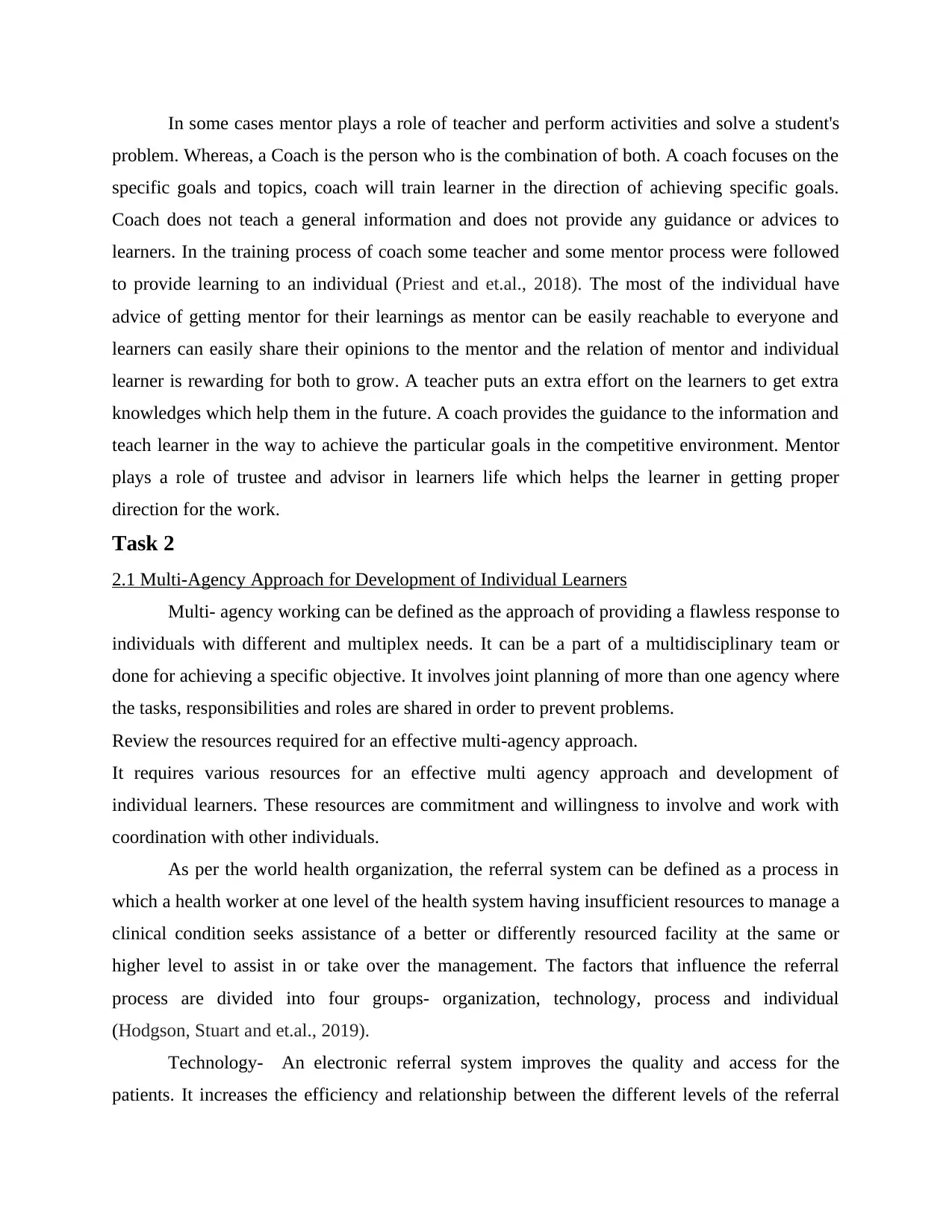
In some cases mentor plays a role of teacher and perform activities and solve a student's
problem. Whereas, a Coach is the person who is the combination of both. A coach focuses on the
specific goals and topics, coach will train learner in the direction of achieving specific goals.
Coach does not teach a general information and does not provide any guidance or advices to
learners. In the training process of coach some teacher and some mentor process were followed
to provide learning to an individual (Priest and et.al., 2018). The most of the individual have
advice of getting mentor for their learnings as mentor can be easily reachable to everyone and
learners can easily share their opinions to the mentor and the relation of mentor and individual
learner is rewarding for both to grow. A teacher puts an extra effort on the learners to get extra
knowledges which help them in the future. A coach provides the guidance to the information and
teach learner in the way to achieve the particular goals in the competitive environment. Mentor
plays a role of trustee and advisor in learners life which helps the learner in getting proper
direction for the work.
Task 2
2.1 Multi-Agency Approach for Development of Individual Learners
Multi- agency working can be defined as the approach of providing a flawless response to
individuals with different and multiplex needs. It can be a part of a multidisciplinary team or
done for achieving a specific objective. It involves joint planning of more than one agency where
the tasks, responsibilities and roles are shared in order to prevent problems.
Review the resources required for an effective multi-agency approach.
It requires various resources for an effective multi agency approach and development of
individual learners. These resources are commitment and willingness to involve and work with
coordination with other individuals.
As per the world health organization, the referral system can be defined as a process in
which a health worker at one level of the health system having insufficient resources to manage a
clinical condition seeks assistance of a better or differently resourced facility at the same or
higher level to assist in or take over the management. The factors that influence the referral
process are divided into four groups- organization, technology, process and individual
(Hodgson, Stuart and et.al., 2019).
Technology- An electronic referral system improves the quality and access for the
patients. It increases the efficiency and relationship between the different levels of the referral
problem. Whereas, a Coach is the person who is the combination of both. A coach focuses on the
specific goals and topics, coach will train learner in the direction of achieving specific goals.
Coach does not teach a general information and does not provide any guidance or advices to
learners. In the training process of coach some teacher and some mentor process were followed
to provide learning to an individual (Priest and et.al., 2018). The most of the individual have
advice of getting mentor for their learnings as mentor can be easily reachable to everyone and
learners can easily share their opinions to the mentor and the relation of mentor and individual
learner is rewarding for both to grow. A teacher puts an extra effort on the learners to get extra
knowledges which help them in the future. A coach provides the guidance to the information and
teach learner in the way to achieve the particular goals in the competitive environment. Mentor
plays a role of trustee and advisor in learners life which helps the learner in getting proper
direction for the work.
Task 2
2.1 Multi-Agency Approach for Development of Individual Learners
Multi- agency working can be defined as the approach of providing a flawless response to
individuals with different and multiplex needs. It can be a part of a multidisciplinary team or
done for achieving a specific objective. It involves joint planning of more than one agency where
the tasks, responsibilities and roles are shared in order to prevent problems.
Review the resources required for an effective multi-agency approach.
It requires various resources for an effective multi agency approach and development of
individual learners. These resources are commitment and willingness to involve and work with
coordination with other individuals.
As per the world health organization, the referral system can be defined as a process in
which a health worker at one level of the health system having insufficient resources to manage a
clinical condition seeks assistance of a better or differently resourced facility at the same or
higher level to assist in or take over the management. The factors that influence the referral
process are divided into four groups- organization, technology, process and individual
(Hodgson, Stuart and et.al., 2019).
Technology- An electronic referral system improves the quality and access for the
patients. It increases the efficiency and relationship between the different levels of the referral
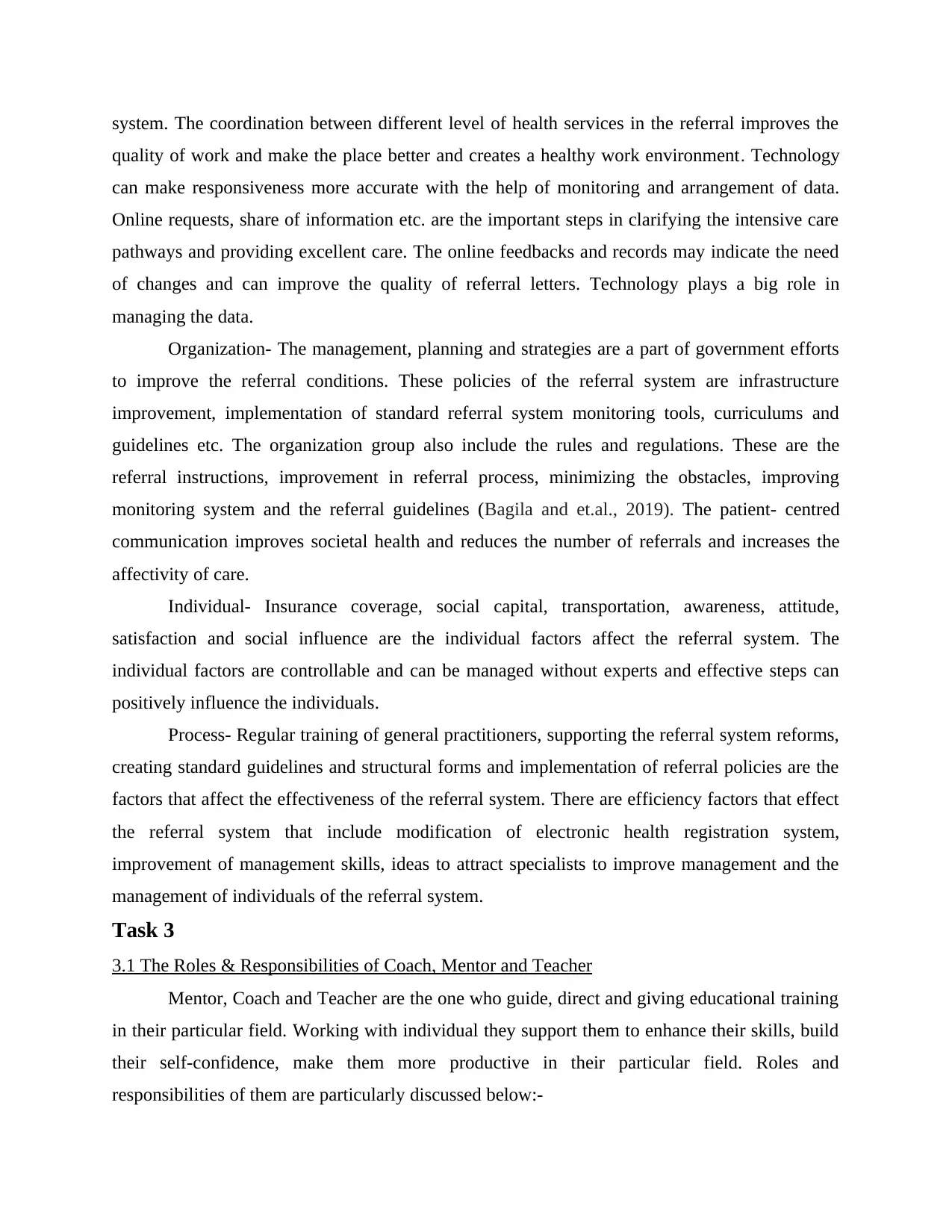
system. The coordination between different level of health services in the referral improves the
quality of work and make the place better and creates a healthy work environment. Technology
can make responsiveness more accurate with the help of monitoring and arrangement of data.
Online requests, share of information etc. are the important steps in clarifying the intensive care
pathways and providing excellent care. The online feedbacks and records may indicate the need
of changes and can improve the quality of referral letters. Technology plays a big role in
managing the data.
Organization- The management, planning and strategies are a part of government efforts
to improve the referral conditions. These policies of the referral system are infrastructure
improvement, implementation of standard referral system monitoring tools, curriculums and
guidelines etc. The organization group also include the rules and regulations. These are the
referral instructions, improvement in referral process, minimizing the obstacles, improving
monitoring system and the referral guidelines (Bagila and et.al., 2019). The patient- centred
communication improves societal health and reduces the number of referrals and increases the
affectivity of care.
Individual- Insurance coverage, social capital, transportation, awareness, attitude,
satisfaction and social influence are the individual factors affect the referral system. The
individual factors are controllable and can be managed without experts and effective steps can
positively influence the individuals.
Process- Regular training of general practitioners, supporting the referral system reforms,
creating standard guidelines and structural forms and implementation of referral policies are the
factors that affect the effectiveness of the referral system. There are efficiency factors that effect
the referral system that include modification of electronic health registration system,
improvement of management skills, ideas to attract specialists to improve management and the
management of individuals of the referral system.
Task 3
3.1 The Roles & Responsibilities of Coach, Mentor and Teacher
Mentor, Coach and Teacher are the one who guide, direct and giving educational training
in their particular field. Working with individual they support them to enhance their skills, build
their self-confidence, make them more productive in their particular field. Roles and
responsibilities of them are particularly discussed below:-
quality of work and make the place better and creates a healthy work environment. Technology
can make responsiveness more accurate with the help of monitoring and arrangement of data.
Online requests, share of information etc. are the important steps in clarifying the intensive care
pathways and providing excellent care. The online feedbacks and records may indicate the need
of changes and can improve the quality of referral letters. Technology plays a big role in
managing the data.
Organization- The management, planning and strategies are a part of government efforts
to improve the referral conditions. These policies of the referral system are infrastructure
improvement, implementation of standard referral system monitoring tools, curriculums and
guidelines etc. The organization group also include the rules and regulations. These are the
referral instructions, improvement in referral process, minimizing the obstacles, improving
monitoring system and the referral guidelines (Bagila and et.al., 2019). The patient- centred
communication improves societal health and reduces the number of referrals and increases the
affectivity of care.
Individual- Insurance coverage, social capital, transportation, awareness, attitude,
satisfaction and social influence are the individual factors affect the referral system. The
individual factors are controllable and can be managed without experts and effective steps can
positively influence the individuals.
Process- Regular training of general practitioners, supporting the referral system reforms,
creating standard guidelines and structural forms and implementation of referral policies are the
factors that affect the effectiveness of the referral system. There are efficiency factors that effect
the referral system that include modification of electronic health registration system,
improvement of management skills, ideas to attract specialists to improve management and the
management of individuals of the referral system.
Task 3
3.1 The Roles & Responsibilities of Coach, Mentor and Teacher
Mentor, Coach and Teacher are the one who guide, direct and giving educational training
in their particular field. Working with individual they support them to enhance their skills, build
their self-confidence, make them more productive in their particular field. Roles and
responsibilities of them are particularly discussed below:-
⊘ This is a preview!⊘
Do you want full access?
Subscribe today to unlock all pages.

Trusted by 1+ million students worldwide
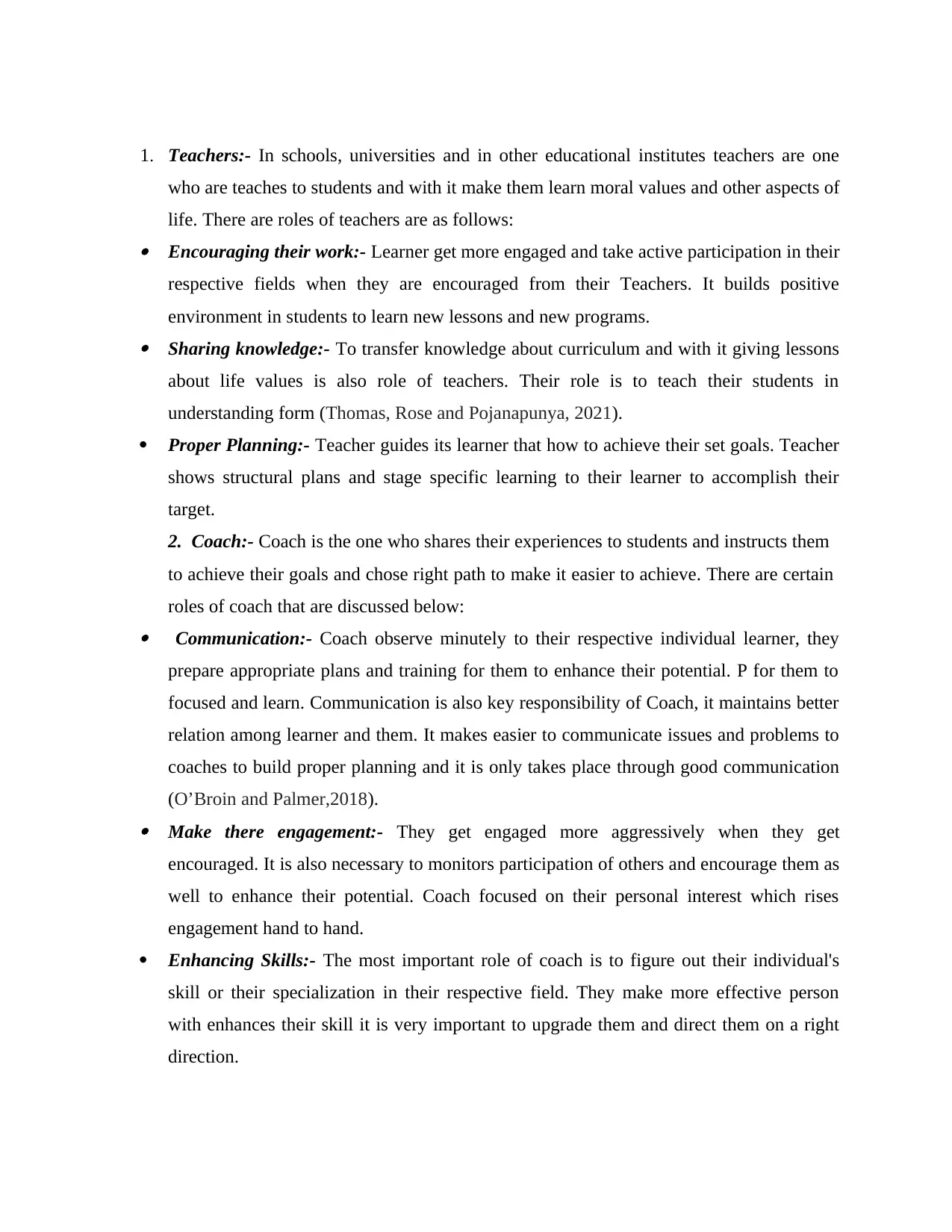
1. Teachers:- In schools, universities and in other educational institutes teachers are one
who are teaches to students and with it make them learn moral values and other aspects of
life. There are roles of teachers are as follows: Encouraging their work:- Learner get more engaged and take active participation in their
respective fields when they are encouraged from their Teachers. It builds positive
environment in students to learn new lessons and new programs. Sharing knowledge:- To transfer knowledge about curriculum and with it giving lessons
about life values is also role of teachers. Their role is to teach their students in
understanding form (Thomas, Rose and Pojanapunya, 2021).
Proper Planning:- Teacher guides its learner that how to achieve their set goals. Teacher
shows structural plans and stage specific learning to their learner to accomplish their
target.
2. Coach:- Coach is the one who shares their experiences to students and instructs them
to achieve their goals and chose right path to make it easier to achieve. There are certain
roles of coach that are discussed below: Communication:- Coach observe minutely to their respective individual learner, they
prepare appropriate plans and training for them to enhance their potential. P for them to
focused and learn. Communication is also key responsibility of Coach, it maintains better
relation among learner and them. It makes easier to communicate issues and problems to
coaches to build proper planning and it is only takes place through good communication
(O’Broin and Palmer,2018). Make there engagement:- They get engaged more aggressively when they get
encouraged. It is also necessary to monitors participation of others and encourage them as
well to enhance their potential. Coach focused on their personal interest which rises
engagement hand to hand.
Enhancing Skills:- The most important role of coach is to figure out their individual's
skill or their specialization in their respective field. They make more effective person
with enhances their skill it is very important to upgrade them and direct them on a right
direction.
who are teaches to students and with it make them learn moral values and other aspects of
life. There are roles of teachers are as follows: Encouraging their work:- Learner get more engaged and take active participation in their
respective fields when they are encouraged from their Teachers. It builds positive
environment in students to learn new lessons and new programs. Sharing knowledge:- To transfer knowledge about curriculum and with it giving lessons
about life values is also role of teachers. Their role is to teach their students in
understanding form (Thomas, Rose and Pojanapunya, 2021).
Proper Planning:- Teacher guides its learner that how to achieve their set goals. Teacher
shows structural plans and stage specific learning to their learner to accomplish their
target.
2. Coach:- Coach is the one who shares their experiences to students and instructs them
to achieve their goals and chose right path to make it easier to achieve. There are certain
roles of coach that are discussed below: Communication:- Coach observe minutely to their respective individual learner, they
prepare appropriate plans and training for them to enhance their potential. P for them to
focused and learn. Communication is also key responsibility of Coach, it maintains better
relation among learner and them. It makes easier to communicate issues and problems to
coaches to build proper planning and it is only takes place through good communication
(O’Broin and Palmer,2018). Make there engagement:- They get engaged more aggressively when they get
encouraged. It is also necessary to monitors participation of others and encourage them as
well to enhance their potential. Coach focused on their personal interest which rises
engagement hand to hand.
Enhancing Skills:- The most important role of coach is to figure out their individual's
skill or their specialization in their respective field. They make more effective person
with enhances their skill it is very important to upgrade them and direct them on a right
direction.
Paraphrase This Document
Need a fresh take? Get an instant paraphrase of this document with our AI Paraphraser
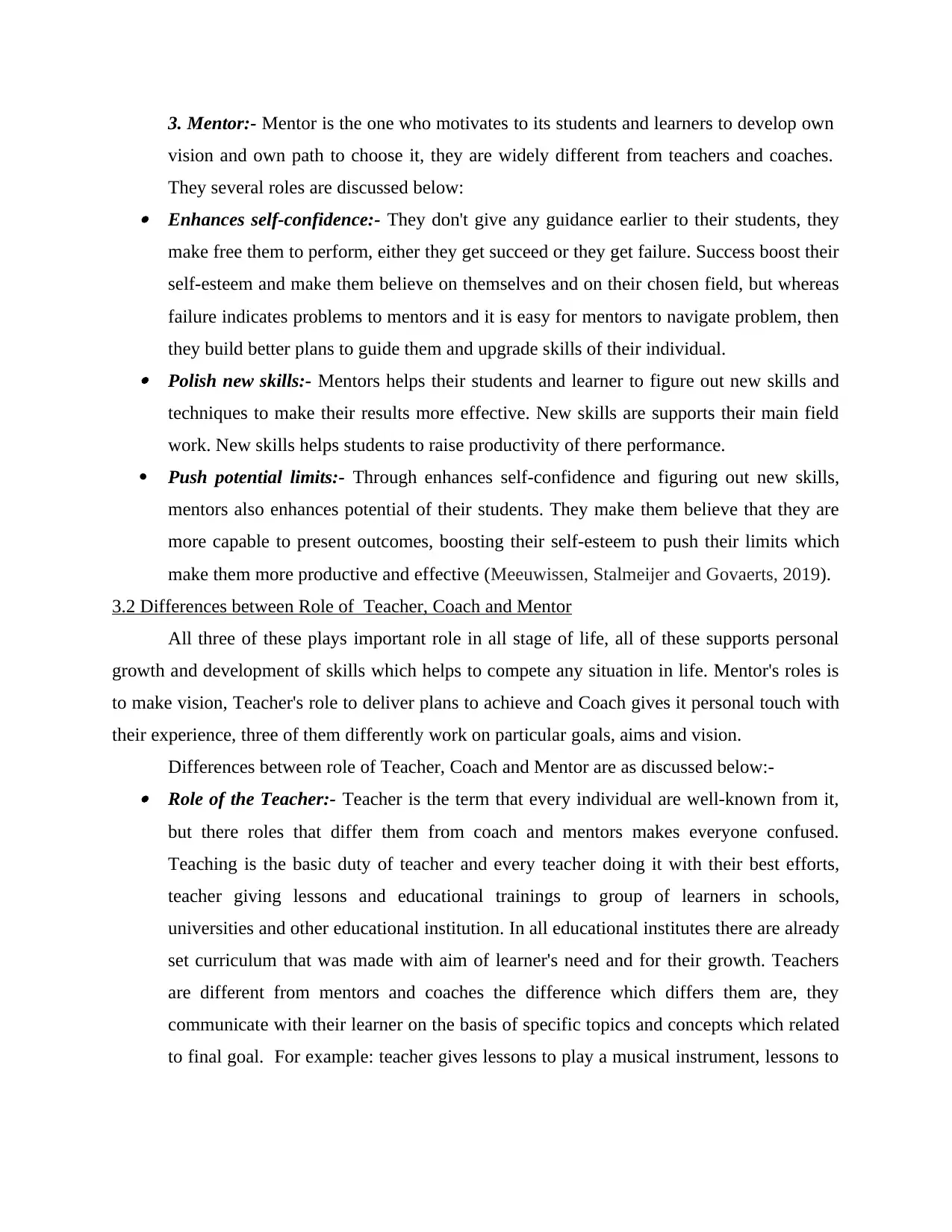
3. Mentor:- Mentor is the one who motivates to its students and learners to develop own
vision and own path to choose it, they are widely different from teachers and coaches.
They several roles are discussed below: Enhances self-confidence:- They don't give any guidance earlier to their students, they
make free them to perform, either they get succeed or they get failure. Success boost their
self-esteem and make them believe on themselves and on their chosen field, but whereas
failure indicates problems to mentors and it is easy for mentors to navigate problem, then
they build better plans to guide them and upgrade skills of their individual. Polish new skills:- Mentors helps their students and learner to figure out new skills and
techniques to make their results more effective. New skills are supports their main field
work. New skills helps students to raise productivity of there performance.
Push potential limits:- Through enhances self-confidence and figuring out new skills,
mentors also enhances potential of their students. They make them believe that they are
more capable to present outcomes, boosting their self-esteem to push their limits which
make them more productive and effective (Meeuwissen, Stalmeijer and Govaerts, 2019).
3.2 Differences between Role of Teacher, Coach and Mentor
All three of these plays important role in all stage of life, all of these supports personal
growth and development of skills which helps to compete any situation in life. Mentor's roles is
to make vision, Teacher's role to deliver plans to achieve and Coach gives it personal touch with
their experience, three of them differently work on particular goals, aims and vision.
Differences between role of Teacher, Coach and Mentor are as discussed below:- Role of the Teacher:- Teacher is the term that every individual are well-known from it,
but there roles that differ them from coach and mentors makes everyone confused.
Teaching is the basic duty of teacher and every teacher doing it with their best efforts,
teacher giving lessons and educational trainings to group of learners in schools,
universities and other educational institution. In all educational institutes there are already
set curriculum that was made with aim of learner's need and for their growth. Teachers
are different from mentors and coaches the difference which differs them are, they
communicate with their learner on the basis of specific topics and concepts which related
to final goal. For example: teacher gives lessons to play a musical instrument, lessons to
vision and own path to choose it, they are widely different from teachers and coaches.
They several roles are discussed below: Enhances self-confidence:- They don't give any guidance earlier to their students, they
make free them to perform, either they get succeed or they get failure. Success boost their
self-esteem and make them believe on themselves and on their chosen field, but whereas
failure indicates problems to mentors and it is easy for mentors to navigate problem, then
they build better plans to guide them and upgrade skills of their individual. Polish new skills:- Mentors helps their students and learner to figure out new skills and
techniques to make their results more effective. New skills are supports their main field
work. New skills helps students to raise productivity of there performance.
Push potential limits:- Through enhances self-confidence and figuring out new skills,
mentors also enhances potential of their students. They make them believe that they are
more capable to present outcomes, boosting their self-esteem to push their limits which
make them more productive and effective (Meeuwissen, Stalmeijer and Govaerts, 2019).
3.2 Differences between Role of Teacher, Coach and Mentor
All three of these plays important role in all stage of life, all of these supports personal
growth and development of skills which helps to compete any situation in life. Mentor's roles is
to make vision, Teacher's role to deliver plans to achieve and Coach gives it personal touch with
their experience, three of them differently work on particular goals, aims and vision.
Differences between role of Teacher, Coach and Mentor are as discussed below:- Role of the Teacher:- Teacher is the term that every individual are well-known from it,
but there roles that differ them from coach and mentors makes everyone confused.
Teaching is the basic duty of teacher and every teacher doing it with their best efforts,
teacher giving lessons and educational trainings to group of learners in schools,
universities and other educational institution. In all educational institutes there are already
set curriculum that was made with aim of learner's need and for their growth. Teachers
are different from mentors and coaches the difference which differs them are, they
communicate with their learner on the basis of specific topics and concepts which related
to final goal. For example: teacher gives lessons to play a musical instrument, lessons to
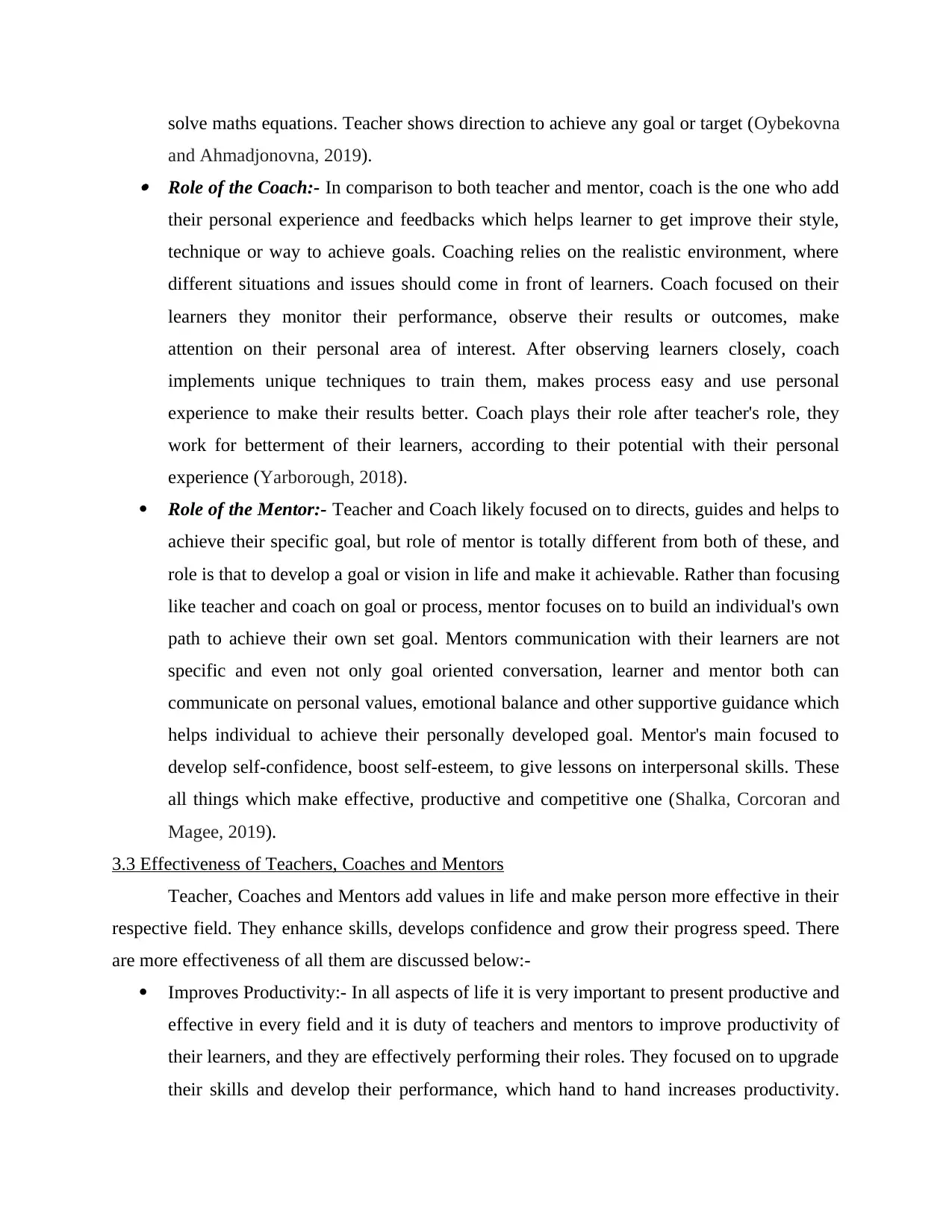
solve maths equations. Teacher shows direction to achieve any goal or target (Oybekovna
and Ahmadjonovna, 2019). Role of the Coach:- In comparison to both teacher and mentor, coach is the one who add
their personal experience and feedbacks which helps learner to get improve their style,
technique or way to achieve goals. Coaching relies on the realistic environment, where
different situations and issues should come in front of learners. Coach focused on their
learners they monitor their performance, observe their results or outcomes, make
attention on their personal area of interest. After observing learners closely, coach
implements unique techniques to train them, makes process easy and use personal
experience to make their results better. Coach plays their role after teacher's role, they
work for betterment of their learners, according to their potential with their personal
experience (Yarborough, 2018).
Role of the Mentor:- Teacher and Coach likely focused on to directs, guides and helps to
achieve their specific goal, but role of mentor is totally different from both of these, and
role is that to develop a goal or vision in life and make it achievable. Rather than focusing
like teacher and coach on goal or process, mentor focuses on to build an individual's own
path to achieve their own set goal. Mentors communication with their learners are not
specific and even not only goal oriented conversation, learner and mentor both can
communicate on personal values, emotional balance and other supportive guidance which
helps individual to achieve their personally developed goal. Mentor's main focused to
develop self-confidence, boost self-esteem, to give lessons on interpersonal skills. These
all things which make effective, productive and competitive one (Shalka, Corcoran and
Magee, 2019).
3.3 Effectiveness of Teachers, Coaches and Mentors
Teacher, Coaches and Mentors add values in life and make person more effective in their
respective field. They enhance skills, develops confidence and grow their progress speed. There
are more effectiveness of all them are discussed below:-
Improves Productivity:- In all aspects of life it is very important to present productive and
effective in every field and it is duty of teachers and mentors to improve productivity of
their learners, and they are effectively performing their roles. They focused on to upgrade
their skills and develop their performance, which hand to hand increases productivity.
and Ahmadjonovna, 2019). Role of the Coach:- In comparison to both teacher and mentor, coach is the one who add
their personal experience and feedbacks which helps learner to get improve their style,
technique or way to achieve goals. Coaching relies on the realistic environment, where
different situations and issues should come in front of learners. Coach focused on their
learners they monitor their performance, observe their results or outcomes, make
attention on their personal area of interest. After observing learners closely, coach
implements unique techniques to train them, makes process easy and use personal
experience to make their results better. Coach plays their role after teacher's role, they
work for betterment of their learners, according to their potential with their personal
experience (Yarborough, 2018).
Role of the Mentor:- Teacher and Coach likely focused on to directs, guides and helps to
achieve their specific goal, but role of mentor is totally different from both of these, and
role is that to develop a goal or vision in life and make it achievable. Rather than focusing
like teacher and coach on goal or process, mentor focuses on to build an individual's own
path to achieve their own set goal. Mentors communication with their learners are not
specific and even not only goal oriented conversation, learner and mentor both can
communicate on personal values, emotional balance and other supportive guidance which
helps individual to achieve their personally developed goal. Mentor's main focused to
develop self-confidence, boost self-esteem, to give lessons on interpersonal skills. These
all things which make effective, productive and competitive one (Shalka, Corcoran and
Magee, 2019).
3.3 Effectiveness of Teachers, Coaches and Mentors
Teacher, Coaches and Mentors add values in life and make person more effective in their
respective field. They enhance skills, develops confidence and grow their progress speed. There
are more effectiveness of all them are discussed below:-
Improves Productivity:- In all aspects of life it is very important to present productive and
effective in every field and it is duty of teachers and mentors to improve productivity of
their learners, and they are effectively performing their roles. They focused on to upgrade
their skills and develop their performance, which hand to hand increases productivity.
⊘ This is a preview!⊘
Do you want full access?
Subscribe today to unlock all pages.

Trusted by 1+ million students worldwide
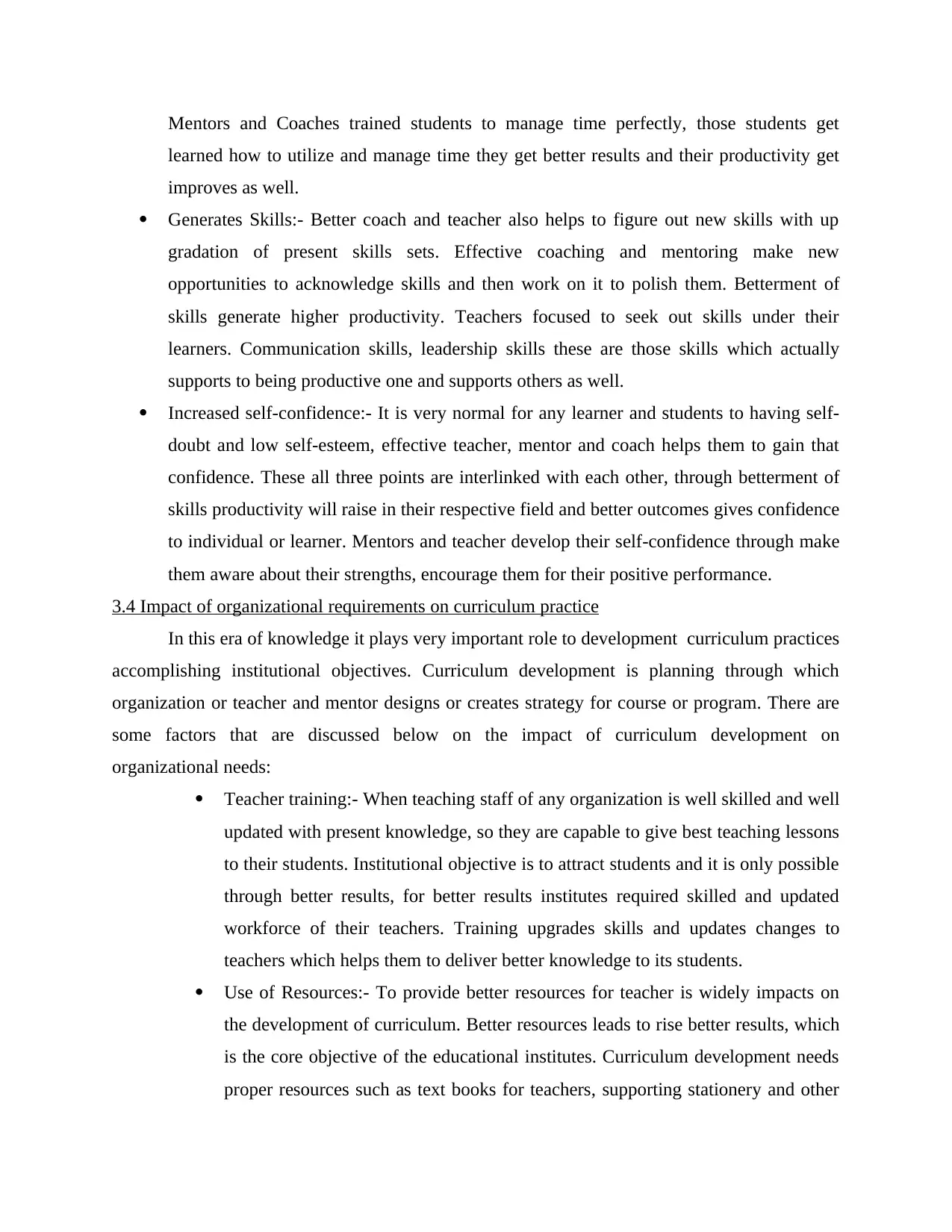
Mentors and Coaches trained students to manage time perfectly, those students get
learned how to utilize and manage time they get better results and their productivity get
improves as well.
Generates Skills:- Better coach and teacher also helps to figure out new skills with up
gradation of present skills sets. Effective coaching and mentoring make new
opportunities to acknowledge skills and then work on it to polish them. Betterment of
skills generate higher productivity. Teachers focused to seek out skills under their
learners. Communication skills, leadership skills these are those skills which actually
supports to being productive one and supports others as well.
Increased self-confidence:- It is very normal for any learner and students to having self-
doubt and low self-esteem, effective teacher, mentor and coach helps them to gain that
confidence. These all three points are interlinked with each other, through betterment of
skills productivity will raise in their respective field and better outcomes gives confidence
to individual or learner. Mentors and teacher develop their self-confidence through make
them aware about their strengths, encourage them for their positive performance.
3.4 Impact of organizational requirements on curriculum practice
In this era of knowledge it plays very important role to development curriculum practices
accomplishing institutional objectives. Curriculum development is planning through which
organization or teacher and mentor designs or creates strategy for course or program. There are
some factors that are discussed below on the impact of curriculum development on
organizational needs:
Teacher training:- When teaching staff of any organization is well skilled and well
updated with present knowledge, so they are capable to give best teaching lessons
to their students. Institutional objective is to attract students and it is only possible
through better results, for better results institutes required skilled and updated
workforce of their teachers. Training upgrades skills and updates changes to
teachers which helps them to deliver better knowledge to its students.
Use of Resources:- To provide better resources for teacher is widely impacts on
the development of curriculum. Better resources leads to rise better results, which
is the core objective of the educational institutes. Curriculum development needs
proper resources such as text books for teachers, supporting stationery and other
learned how to utilize and manage time they get better results and their productivity get
improves as well.
Generates Skills:- Better coach and teacher also helps to figure out new skills with up
gradation of present skills sets. Effective coaching and mentoring make new
opportunities to acknowledge skills and then work on it to polish them. Betterment of
skills generate higher productivity. Teachers focused to seek out skills under their
learners. Communication skills, leadership skills these are those skills which actually
supports to being productive one and supports others as well.
Increased self-confidence:- It is very normal for any learner and students to having self-
doubt and low self-esteem, effective teacher, mentor and coach helps them to gain that
confidence. These all three points are interlinked with each other, through betterment of
skills productivity will raise in their respective field and better outcomes gives confidence
to individual or learner. Mentors and teacher develop their self-confidence through make
them aware about their strengths, encourage them for their positive performance.
3.4 Impact of organizational requirements on curriculum practice
In this era of knowledge it plays very important role to development curriculum practices
accomplishing institutional objectives. Curriculum development is planning through which
organization or teacher and mentor designs or creates strategy for course or program. There are
some factors that are discussed below on the impact of curriculum development on
organizational needs:
Teacher training:- When teaching staff of any organization is well skilled and well
updated with present knowledge, so they are capable to give best teaching lessons
to their students. Institutional objective is to attract students and it is only possible
through better results, for better results institutes required skilled and updated
workforce of their teachers. Training upgrades skills and updates changes to
teachers which helps them to deliver better knowledge to its students.
Use of Resources:- To provide better resources for teacher is widely impacts on
the development of curriculum. Better resources leads to rise better results, which
is the core objective of the educational institutes. Curriculum development needs
proper resources such as text books for teachers, supporting stationery and other
Paraphrase This Document
Need a fresh take? Get an instant paraphrase of this document with our AI Paraphraser
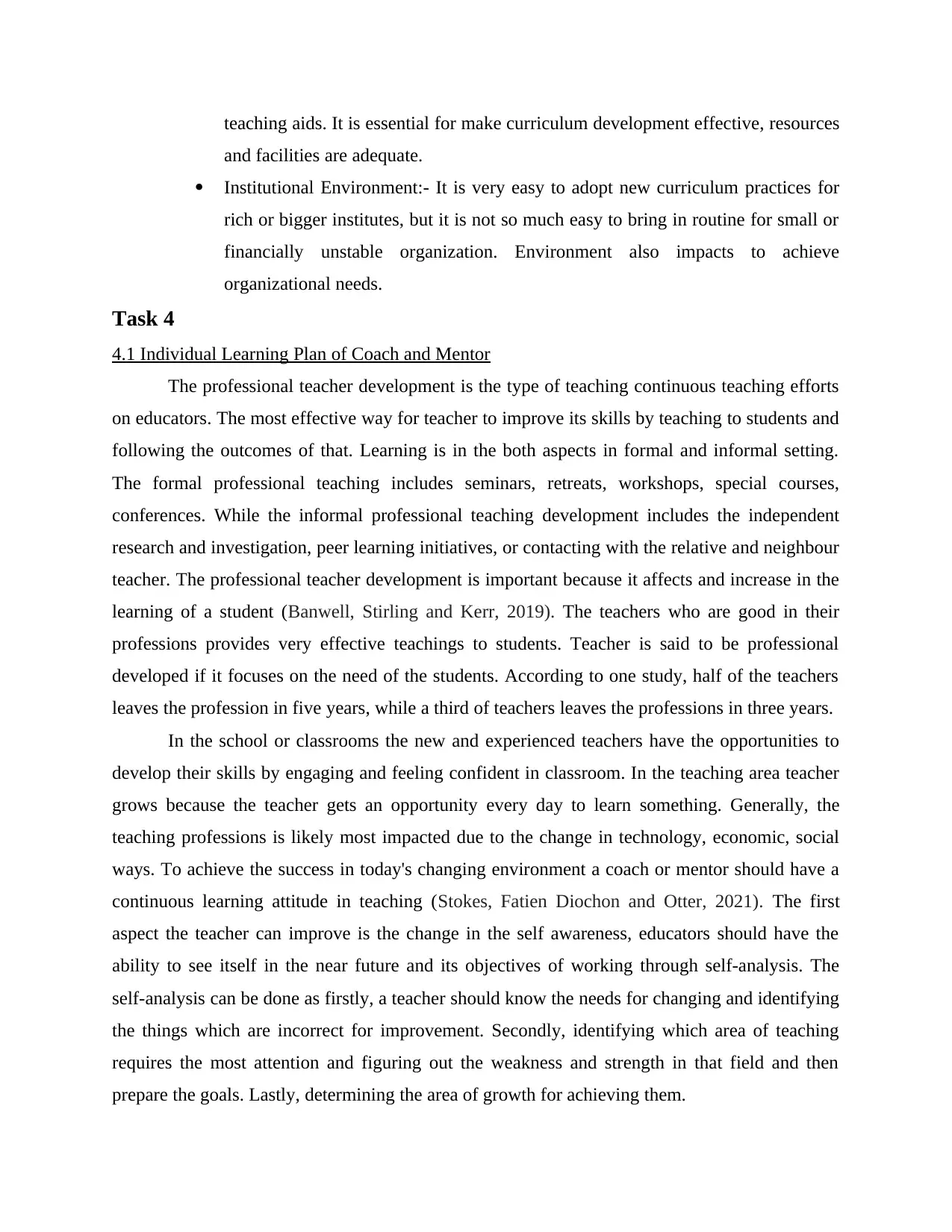
teaching aids. It is essential for make curriculum development effective, resources
and facilities are adequate.
Institutional Environment:- It is very easy to adopt new curriculum practices for
rich or bigger institutes, but it is not so much easy to bring in routine for small or
financially unstable organization. Environment also impacts to achieve
organizational needs.
Task 4
4.1 Individual Learning Plan of Coach and Mentor
The professional teacher development is the type of teaching continuous teaching efforts
on educators. The most effective way for teacher to improve its skills by teaching to students and
following the outcomes of that. Learning is in the both aspects in formal and informal setting.
The formal professional teaching includes seminars, retreats, workshops, special courses,
conferences. While the informal professional teaching development includes the independent
research and investigation, peer learning initiatives, or contacting with the relative and neighbour
teacher. The professional teacher development is important because it affects and increase in the
learning of a student (Banwell, Stirling and Kerr, 2019). The teachers who are good in their
professions provides very effective teachings to students. Teacher is said to be professional
developed if it focuses on the need of the students. According to one study, half of the teachers
leaves the profession in five years, while a third of teachers leaves the professions in three years.
In the school or classrooms the new and experienced teachers have the opportunities to
develop their skills by engaging and feeling confident in classroom. In the teaching area teacher
grows because the teacher gets an opportunity every day to learn something. Generally, the
teaching professions is likely most impacted due to the change in technology, economic, social
ways. To achieve the success in today's changing environment a coach or mentor should have a
continuous learning attitude in teaching (Stokes, Fatien Diochon and Otter, 2021). The first
aspect the teacher can improve is the change in the self awareness, educators should have the
ability to see itself in the near future and its objectives of working through self-analysis. The
self-analysis can be done as firstly, a teacher should know the needs for changing and identifying
the things which are incorrect for improvement. Secondly, identifying which area of teaching
requires the most attention and figuring out the weakness and strength in that field and then
prepare the goals. Lastly, determining the area of growth for achieving them.
and facilities are adequate.
Institutional Environment:- It is very easy to adopt new curriculum practices for
rich or bigger institutes, but it is not so much easy to bring in routine for small or
financially unstable organization. Environment also impacts to achieve
organizational needs.
Task 4
4.1 Individual Learning Plan of Coach and Mentor
The professional teacher development is the type of teaching continuous teaching efforts
on educators. The most effective way for teacher to improve its skills by teaching to students and
following the outcomes of that. Learning is in the both aspects in formal and informal setting.
The formal professional teaching includes seminars, retreats, workshops, special courses,
conferences. While the informal professional teaching development includes the independent
research and investigation, peer learning initiatives, or contacting with the relative and neighbour
teacher. The professional teacher development is important because it affects and increase in the
learning of a student (Banwell, Stirling and Kerr, 2019). The teachers who are good in their
professions provides very effective teachings to students. Teacher is said to be professional
developed if it focuses on the need of the students. According to one study, half of the teachers
leaves the profession in five years, while a third of teachers leaves the professions in three years.
In the school or classrooms the new and experienced teachers have the opportunities to
develop their skills by engaging and feeling confident in classroom. In the teaching area teacher
grows because the teacher gets an opportunity every day to learn something. Generally, the
teaching professions is likely most impacted due to the change in technology, economic, social
ways. To achieve the success in today's changing environment a coach or mentor should have a
continuous learning attitude in teaching (Stokes, Fatien Diochon and Otter, 2021). The first
aspect the teacher can improve is the change in the self awareness, educators should have the
ability to see itself in the near future and its objectives of working through self-analysis. The
self-analysis can be done as firstly, a teacher should know the needs for changing and identifying
the things which are incorrect for improvement. Secondly, identifying which area of teaching
requires the most attention and figuring out the weakness and strength in that field and then
prepare the goals. Lastly, determining the area of growth for achieving them.
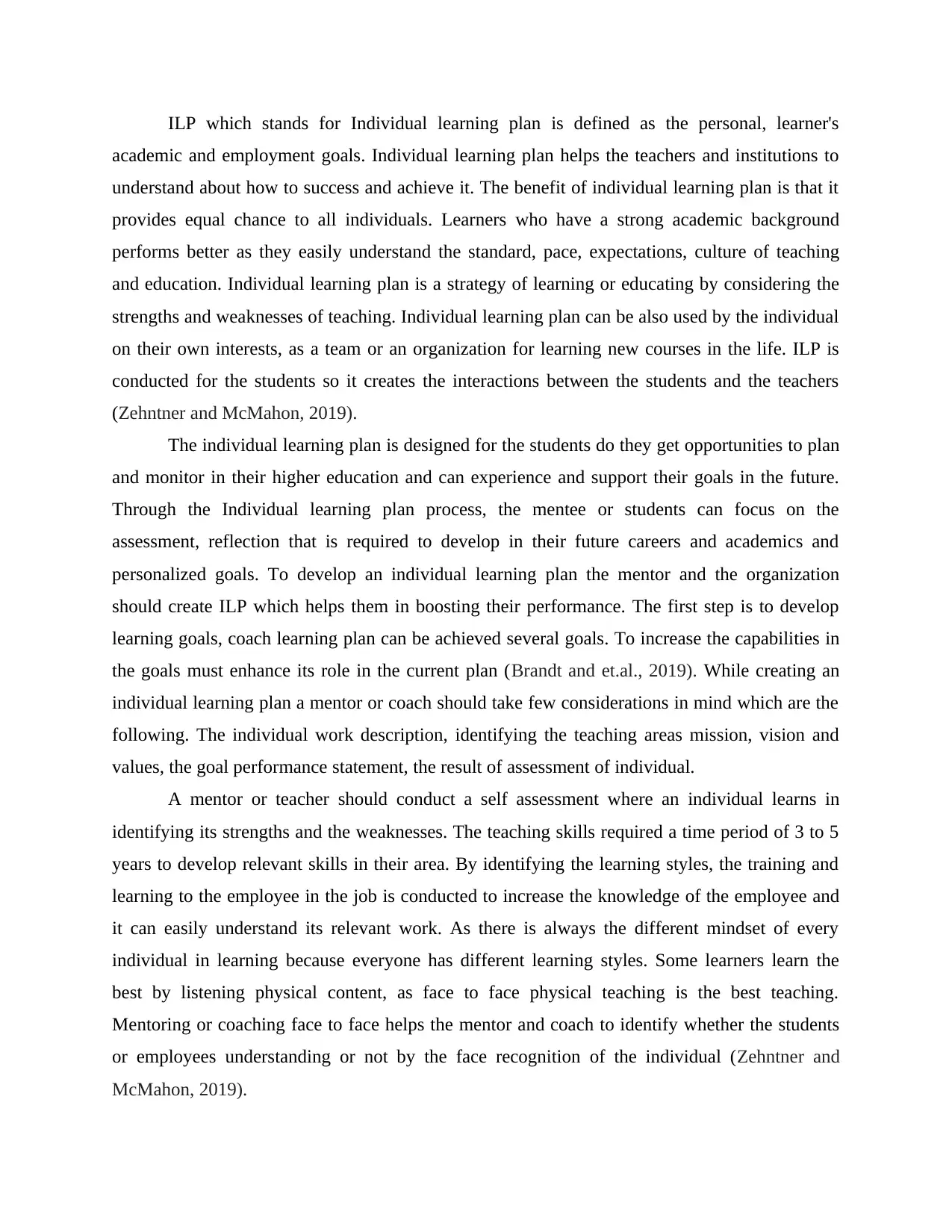
ILP which stands for Individual learning plan is defined as the personal, learner's
academic and employment goals. Individual learning plan helps the teachers and institutions to
understand about how to success and achieve it. The benefit of individual learning plan is that it
provides equal chance to all individuals. Learners who have a strong academic background
performs better as they easily understand the standard, pace, expectations, culture of teaching
and education. Individual learning plan is a strategy of learning or educating by considering the
strengths and weaknesses of teaching. Individual learning plan can be also used by the individual
on their own interests, as a team or an organization for learning new courses in the life. ILP is
conducted for the students so it creates the interactions between the students and the teachers
(Zehntner and McMahon, 2019).
The individual learning plan is designed for the students do they get opportunities to plan
and monitor in their higher education and can experience and support their goals in the future.
Through the Individual learning plan process, the mentee or students can focus on the
assessment, reflection that is required to develop in their future careers and academics and
personalized goals. To develop an individual learning plan the mentor and the organization
should create ILP which helps them in boosting their performance. The first step is to develop
learning goals, coach learning plan can be achieved several goals. To increase the capabilities in
the goals must enhance its role in the current plan (Brandt and et.al., 2019). While creating an
individual learning plan a mentor or coach should take few considerations in mind which are the
following. The individual work description, identifying the teaching areas mission, vision and
values, the goal performance statement, the result of assessment of individual.
A mentor or teacher should conduct a self assessment where an individual learns in
identifying its strengths and the weaknesses. The teaching skills required a time period of 3 to 5
years to develop relevant skills in their area. By identifying the learning styles, the training and
learning to the employee in the job is conducted to increase the knowledge of the employee and
it can easily understand its relevant work. As there is always the different mindset of every
individual in learning because everyone has different learning styles. Some learners learn the
best by listening physical content, as face to face physical teaching is the best teaching.
Mentoring or coaching face to face helps the mentor and coach to identify whether the students
or employees understanding or not by the face recognition of the individual (Zehntner and
McMahon, 2019).
academic and employment goals. Individual learning plan helps the teachers and institutions to
understand about how to success and achieve it. The benefit of individual learning plan is that it
provides equal chance to all individuals. Learners who have a strong academic background
performs better as they easily understand the standard, pace, expectations, culture of teaching
and education. Individual learning plan is a strategy of learning or educating by considering the
strengths and weaknesses of teaching. Individual learning plan can be also used by the individual
on their own interests, as a team or an organization for learning new courses in the life. ILP is
conducted for the students so it creates the interactions between the students and the teachers
(Zehntner and McMahon, 2019).
The individual learning plan is designed for the students do they get opportunities to plan
and monitor in their higher education and can experience and support their goals in the future.
Through the Individual learning plan process, the mentee or students can focus on the
assessment, reflection that is required to develop in their future careers and academics and
personalized goals. To develop an individual learning plan the mentor and the organization
should create ILP which helps them in boosting their performance. The first step is to develop
learning goals, coach learning plan can be achieved several goals. To increase the capabilities in
the goals must enhance its role in the current plan (Brandt and et.al., 2019). While creating an
individual learning plan a mentor or coach should take few considerations in mind which are the
following. The individual work description, identifying the teaching areas mission, vision and
values, the goal performance statement, the result of assessment of individual.
A mentor or teacher should conduct a self assessment where an individual learns in
identifying its strengths and the weaknesses. The teaching skills required a time period of 3 to 5
years to develop relevant skills in their area. By identifying the learning styles, the training and
learning to the employee in the job is conducted to increase the knowledge of the employee and
it can easily understand its relevant work. As there is always the different mindset of every
individual in learning because everyone has different learning styles. Some learners learn the
best by listening physical content, as face to face physical teaching is the best teaching.
Mentoring or coaching face to face helps the mentor and coach to identify whether the students
or employees understanding or not by the face recognition of the individual (Zehntner and
McMahon, 2019).
⊘ This is a preview!⊘
Do you want full access?
Subscribe today to unlock all pages.

Trusted by 1+ million students worldwide
1 out of 20
Related Documents
Your All-in-One AI-Powered Toolkit for Academic Success.
+13062052269
info@desklib.com
Available 24*7 on WhatsApp / Email
![[object Object]](/_next/static/media/star-bottom.7253800d.svg)
Unlock your academic potential
Copyright © 2020–2026 A2Z Services. All Rights Reserved. Developed and managed by ZUCOL.



